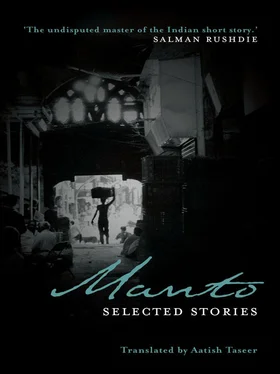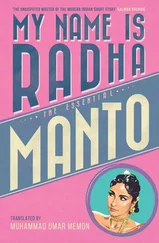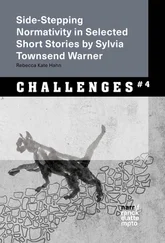He said, ‘Alright Begum saab, you wouldn’t lie.’ When my wife paid him for sixty clothes items, he touched the money to his forehead and headed out. My wife stopped him. ‘Dhobi, wait, there weren’t sixty pieces of clothing, there were a hundred and fifty. Here’s the rest of your money; I was just joking.’
The dhobi only said, ‘Begum saab, you wouldn’t lie.’ He touched the rest of the money to his forehead, said ‘salaam’, and walked out.
Two years after I got married, I moved to Delhi. I stayed there for a year and a half before returning to Bombay, where I rented a flat in Mahim. In the span of three months, we changed dhobis four times because they were quarrelsome and crooked. After every wash, there would be a scene. Sometimes the quality of the wash was intolerably wretched; other times, too few clothes were returned. We missed our old dhobi. One day when we had gone through all our dhobis, he showed up with no warning, saying, ‘I saw saab in the bus. I said, “How’s this?” I made enquiries in Byculla and the brander told me to inquire here in Mahim. In the next door flat, I found saab’s friend and so here I am.’ We were thrilled, and at least on the laundry front, a period of joy and contentment began.
A Congress government came to power and a prohibition on alcohol was imposed. English alcohol was still available, but the making and selling of Indian alcohol was completely stopped. Ninety nine percent of the dhobis were alcoholics. That quart or half quart of alcohol, after a day spent among soap and water, was a ritual in their lives. Our dhobi had fallen ill, then tried treating his illness with the spurious alcohol that was being made illegally and sold in secret. It made him dangerously ill, bringing him close to death.
I was incredibly busy at the time, leaving the house at six in the morning and returning at ten, ten thirty at night. But when my wife heard that the dhobi was seriously ill, she went directly to his house. With the help of a servant and the taxi driver, she put him in a taxi and took him to a doctor. The doctor, moved himself by the dhobi’s condition, refused money for his treatment. But my wife said, ‘Doctor saab, you cannot keep all the merit of this good deed for yourself.’
The doctor smiled and said, ‘Fine, let’s go halves,’ taking only half the money for the treatment.
In time, the dhobi was cured. A few injections got rid of his stomach infection and, with strong medicine, his weakness gradually went away. In a few months, he was completely well and sent up prayers for us every time he rose or sat down: ‘May God make saab like Saeed Salim barrister; may saab be able to live in Colaba; may God give him a little brood; lots and lots of money. Begum saab came to get the dhobi in a motor car; she took him to a very big doctor near the fort; may God keep Begum saab happy.’
Many years passed. The country saw many upheavals. The dhobi came and went without fail every Sunday. He was now perfectly healthy; he never forgot what we had done for him; he still sent up prayers for us. He had also given up liquor. In the beginning, he missed it, but now he didn’t so much as mention it. Despite an entire day spent in water, he felt no need for liquor to relieve his fatigue.
Then troubled times came; no sooner had Partition happened than Hindu — Muslim riots broke out. In daylight, and at night, Muslims in Hindu neighbourhoods, and Hindus in Muslim neighbourhoods, were being killed. My wife left for Lahore.
When the situation worsened, I said to the dhobi, ‘Listen dhobi, you better stop your work now. This is a Muslim neighbourhood. You don’t want to end up dead.’
The dhobi smiled, ‘Saab, nobody will hurt me.’
There were many incidents of violence in our own neighbourhood, but the dhobi continued to come without fail.
One Sunday morning, I was at home reading the paper. The sports page showed the tally of cricket scores while the front page, that of Hindus and Muslims killed in the riots. I was focusing on the terrifying similarity of both scores when the dhobi arrived. I opened the copybook and checked the clothes against it. The dhobi started laughing and chatting. ‘Saeed Salim barrister was a very nice man. When he left, he gave me one turban, one dhoti and one kurta. Your begum saab was also a first rate person. She’s gone away, no? To her country? If you write her a letter, send my “salaam”. She came in a motor car to my room. I had such diarrhoea. The doctor gave me an injection. I got well immediately. If you write her a letter, send my “salaam”. Tell her Ram Khilavan says to write him a letter too.’
I cut him off sharply. ‘Dhobi, have you started drinking again?’
He laughed, ‘Drink? Where can one get drink?’
I didn’t think it apposite to say more. He wrapped the dirty clothes in a bundle and went off.
In a few days, the situation became still worse. Wire after wire began to come from Lahore: ‘Leave everything and come at once.’ I decided at the beginning of the week that I would leave on Sunday, but as it turned out, I had to prepare to leave early the following day.
But the clothes were with the dhobi. I thought I might retrieve them from his place before the curfew started. So that evening I took a Victoria and went to Mahalakshmi.
There was an hour left before the curfew and there was still traffic on the streets, trams were still running. My Victoria had just reached the bridge when, all of a sudden, a great commotion broke out. People ran blindly in all directions. It was as if a bullfight had begun. When the crowd thinned, I saw many dhobis in the distance with lathis in hand, dancing. Strange, indistinct sounds rose from their throats. It was where I was headed, but when I told the Victoria driver, he refused to take me. I paid him his fare and continued on foot. When I came near the dhobis, they saw me and fell silent.
I approached one dhobi and said, ‘Where does Ram Khilavan live?’ Another dhobi with a lathi in his hand reeled towards us. ‘What’s he asking?’ he said to the dhobi I’d put the question to.
‘He wants to know where Ram Khilavan lives.’
The blind-drunk dhobi came close to me and pushed up against me. ‘Who are you?’
‘Me? Ram Khilavan is my dhobi.’
‘Ram Khilavan is your dhobi. But which dhobi’s runt are you?’
One yelled, ‘A Hindu dhobi’s or a Muslim dhobi’s?’
The crowd of dhobis, senselessly drunk, closed in around me with their fists up, swinging their lathis. I had to answer their question: was I Muslim or Hindu? I was terrified. The question of running away didn’t arise because they had surrounded me. There were no policemen nearby to whom I could cry out for help. Dazed with fear, I started speaking in broken sentences. ‘Ram Khilavan is a Hindu… I’m asking where he lives… Where is his room… He’s been my dhobi for ten years… He was very sick… I had him treated… My begum… My memsaab came with a motor car…’ I got so far and felt terrible pity for myself. I was filled with shame at the depths to which men were willing to sink in order to save their lives. My wretchedness made me reckless. ‘I’m Muslim,’ I said.
Loud cries of ‘Kill him, kill him,’ rose from the crowd.
The dhobi, who was soused to the eyeballs drifted to one side, and said, ‘Wait. Ram Khilavan will kill him.’
I turned and looked up. Ram Khilavan stood over me, wielding a heavy cudgel in his hand. He looked in my direction and began to hurl insults at Muslims in his language. Raising the cudgel over his head, he advanced on me, swearing the whole time.
‘Ram Khilavan!’ I yelled authoritatively.
‘Shut your mouth!’ he barked, ‘“Ram Khilavan…” ’
My last hope had gone out. When he was close to me, I said softly, in a parched voice, ‘You don’t recognise me, Ram Khilavan?’
Читать дальше












